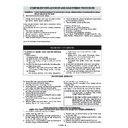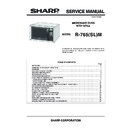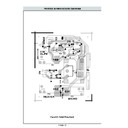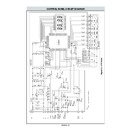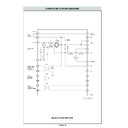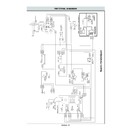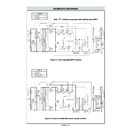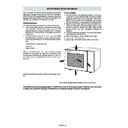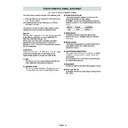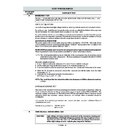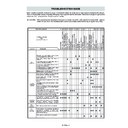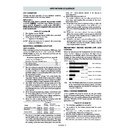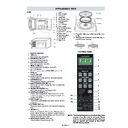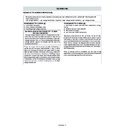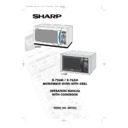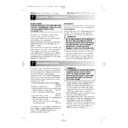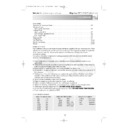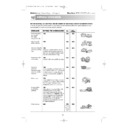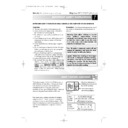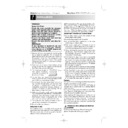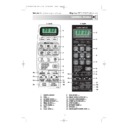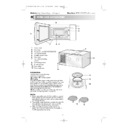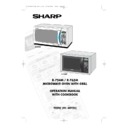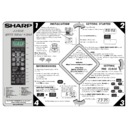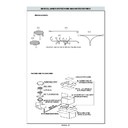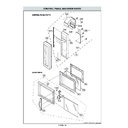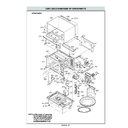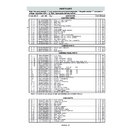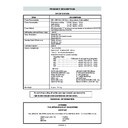Read Sharp R-765M (serv.man9) Service Manual online
R-765M - 20
9. Lift the entire case from the oven.
10.Discharge the H.V. capacitor before carrying out any
10.Discharge the H.V. capacitor before carrying out any
further work.
11.Do not operate the oven with the outer case removed.
N.B.; Step 1, 2 and 10 form the basis of the 3D checks.
N.B.; Step 1, 2 and 10 form the basis of the 3D checks.
CAUTION: DISCHARGE HIGH VOLTAGE CAPACI-
TOR BEFORE TOUCHING ANY OVEN
COMPONENT OR WIRING.
COMPONENT OR WIRING.
CAUTION: WHEN THE OUTER CASE CABINET IS
RE-INSTALLED, INSTALL IT BEFORE THE
REAR AIR ANGLE, AIR DUCT AND BACK
PLATE ARE INSTALLED, OR THE OUTER
CASE CABINET WILL BE DEFORMED.
REAR AIR ANGLE, AIR DUCT AND BACK
PLATE ARE INSTALLED, OR THE OUTER
CASE CABINET WILL BE DEFORMED.
COMPONENT REPLACEMENT AND ADJUSTMENT PROCEDURE
WARNING: Avoid possible exposure to microwave energy. Please follow the instructions below
before operating the oven.
1. Disconnect oven from power supply.
2. Visually check the door and cavity face plate for dam-
age (dents, cracks, signs of arcing etc.).
Carry out any remedial work that is necessary before
operating the oven.
Do not operate the oven if any of the following conditions
exist;
1. Door does not close firmly.
2. Door hinge, support or latch hook is damaged.
3. The door gasket or seal or damaged.
4. The door is bent or warped.
5. There are defective parts in the door interlock system.
operating the oven.
Do not operate the oven if any of the following conditions
exist;
1. Door does not close firmly.
2. Door hinge, support or latch hook is damaged.
3. The door gasket or seal or damaged.
4. The door is bent or warped.
5. There are defective parts in the door interlock system.
6. There are defective parts in the microwave generating
and transmission assembly.
7. There is visible damage to the oven.
Do not operate the oven:
1. Without the RF gasket (Magnetron).
2. If the wave guide or oven cavity are not intact.
3. If the door is not closed.
4. If the outer case (cabinet) is not fitted.
Please refer to ‘OVEN PARTS, CABINET PARTS, CON-
TROL PANEL PARTS, DOOR PARTS’, when carrying out
1. Without the RF gasket (Magnetron).
2. If the wave guide or oven cavity are not intact.
3. If the door is not closed.
4. If the outer case (cabinet) is not fitted.
Please refer to ‘OVEN PARTS, CABINET PARTS, CON-
TROL PANEL PARTS, DOOR PARTS’, when carrying out
any of the following removal procedures:
WARNING FOR WIRING
To prevent an electric shock, take the following
manners.
1. Before wiring,
manners.
1. Before wiring,
1) Disconnect the power supply.
2) Open the door and wedge the door open.
3) Discharge the high voltage capacitor and wait for
2) Open the door and wedge the door open.
3) Discharge the high voltage capacitor and wait for
60 seconds.
2. Don't let the wire leads touch to the following parts;
1) High voltage parts:
Magnetron, High voltage transformer, High volt-
age capacitor and High voltage rectifier assembly.
age capacitor and High voltage rectifier assembly.
2) Hot parts:
Grill heating element, Oven lamp, Magnetron,
High voltage transformer and Oven cavity.
3) Sharp edge:
Bottom plate, Oven cavity, Weveguide flange,
Chassis support and other metallic plate.
Chassis support and other metallic plate.
4) Movable parts (to prevent a fault)
Fan blade, Fan motor, Switch and Turntable
motor.
motor.
3. Do not catch the wire leads in the outer case cabinet.
4. Insert the positive lock connector certainly until its pin
4. Insert the positive lock connector certainly until its pin
is locked. And make sure that the wire leads should
not come off even if the wire leads is pulled.
not come off even if the wire leads is pulled.
5. To prevent an error function, connect the wire leads
correctly, referring to the Pictorial Diagram.
4. Remove one (1) screw holding fan duct to the oven
cavity rear plate.
5. Remove one (1) screw holding capacitor holder to the
oven cavity rear plate.
6. Release the capacitor holder from the fan duct.
7. Remove the high voltage capacitor from the capacitor
7. Remove the high voltage capacitor from the capacitor
OUTER CASE REMOVAL
To remove the outer case proceed as follows.
1. Disconnect oven from power supply.
2. Open the oven door and wedge it open.
3. Remove the one (1) screw holding the back plate to the
1. Disconnect oven from power supply.
2. Open the oven door and wedge it open.
3. Remove the one (1) screw holding the back plate to the
oven cavity rear plate. Remove the back plate.
4. Remove the one (1) screw holding the air duct assem-
bly to the oven cavity rear plate.
5. Remove the air duct assembly
6. Remove the two (2) screws holding the rear air angle
6. Remove the two (2) screws holding the rear air angle
to the outer case cabinet.
7. Remove the six (6) screws from rear and along the side
edge of case.
8. Slide the entire case back about 3 cm to free it from
retaining clips on the cavity face plate.
HIGH VOLTAGE COMPONENTS REMOVAL
(HIGH VOLTAGE CAPACITOR AND HIGH VOLTAGE RECTIFIER ASSEMBLY)
To remove the components, proceed as follows.
1. CARRY OUT 3D CHECKS.
2. Disconnect the filament lead and high voltage wire of
2. Disconnect the filament lead and high voltage wire of
the high voltage transformer and the high voltage wire
B from the high voltage capacitor.
B from the high voltage capacitor.
3. Remove one (1) screw holding earth side terminal of
the high voltage rectifier assembly.
R-765M - 21
HIGH VOLTAGE TRANSFORMER REMOVAL
1. CARRY OUT 3D CHECKS.
2. Disconnect the filament leads and high voltage wire of
high voltage transformer from high voltage capacitor
and the magnetron.
and the magnetron.
3. Disconnect the main wire harness from the high volt-
age transformer.
4. Remove the two (2) screws and one (1) washer holding
the transformer to the base plate.
5. Remove the transformer.
6. Now the high voltage transformer is free.
6. Now the high voltage transformer is free.
1. CARRY OUT 3D CHECKS.
2. Disconnect the H.V. wire B and filament lead of the
2. Disconnect the H.V. wire B and filament lead of the
transformer from the magnetron.
3. Remove the one (1) screw holding the chassis support
to the magnetron.
4. Move the air intake duct to left.
5. Carefully remove the screws holding the magnetron to
5. Carefully remove the screws holding the magnetron to
the waveguide, when removing the screws hold the
magnetron to prevent it from falling.
magnetron to prevent it from falling.
6. Remove the magnetron from the waveguide with care
so the magnetron antenna is not hit by any metal object
around the antenna.
around the antenna.
CAUTION: WHEN REPLACING THE MAGNETRON,
BE SURE THE R.F. GASKET IS IN PLACE
AND THE MAGNETRON MOUNTING
SCREWS ARE TIGHTENED SECURELY.
AND THE MAGNETRON MOUNTING
SCREWS ARE TIGHTENED SECURELY.
MAGNETRON REMOVAL
key fixing frame, adjust the lower edge and right edge
of the key unit (FPC membrane) to the correct position
of key fixing frame.
of the key unit (FPC membrane) to the correct position
of key fixing frame.
3. Stick the key unit (FPC membrane) firmly to the key
fixing frame by rubbing with soft cloth not to scratch.
4. After attaching the FPC membrane, attach the graphic
sheet to the FPC membrane. And adjust the lower
edge and rifgt edge of the graphic sheet to the correct
position of the key fixing frame.
edge and rifgt edge of the graphic sheet to the correct
position of the key fixing frame.
2. Disconnect the wire leads and the connectors from the
control unit.
3. Lift up the control panel assembly and pull it forward.
Now the control panel assembly is free.
NOTE:
1. Before attaching a new key unit (FPC membrane),
1. Before attaching a new key unit (FPC membrane),
wipe off remaining adhesive on the key fixing frame
surfaces completely with a soft cloth soaked in alcohol.
surfaces completely with a soft cloth soaked in alcohol.
2. When attaching the key unit (FPC membrane) to the
CONTROL PANEL ASSEMBLY REMOVAL
1. CARRY OUT 3D CHECKS.
POSITIVE LOCK
®
CONNECTOR REMOVAL
1. CARRY OUT 3D CHECKS.
FAN MOTOR REPLACEMENT
REMOVAL
2. Push the lever of positive lock
®
connector.
3. Pull down on the positive lock
®
connector.
CAUTION: WHEN YOU (SERVICE ENGINEER) CON-
NECT THE POSITIVE LOCK
®
CONNEC-
TORS TO THE TERMINALS, CONNECT
THE POSITIVE LOCK
THE POSITIVE LOCK
®
SO THAT THE LE-
VER FACES YOU.
Figure C-1. Positive lock
®
connector
holder.
8. Disconnect the high voltage rectifier assembly from
the high voltage capacitor.
9. Now, the high voltage rectifier assembly and the high
voltage capacitor should be free.
CAUTION: WHEN REPLACING HIGH VOLTAGE
RECTIFIER ASSEMBLY, ENSURE THAT
THE CATHODE (EARTH) CONNECTION
IS SECURELY FIXED TO THE CAPACI-
TOR HOLDER WITH AN EARTHING
SCREW.
THE CATHODE (EARTH) CONNECTION
IS SECURELY FIXED TO THE CAPACI-
TOR HOLDER WITH AN EARTHING
SCREW.
2. Remove the one (1) screw holding the noise filter to the
chassis support.
3. Release the noise filter from the tabs of the fan duct.
4. Remove the two (2) screws holding the chassis sup-
4. Remove the two (2) screws holding the chassis sup-
port to the oven cavity front flange and the magnetron.
5. Remove the chassis support from the oven cavity.
6. Disconnect the wire leads from the fan motor.
7. Remove the one (1) screw holding the capacitor holder
6. Disconnect the wire leads from the fan motor.
7. Remove the one (1) screw holding the capacitor holder
to the oven cavity back plate.
8. Remove the one (1) screw holding the fan duct to the
oven cavity back plate.
1. CARRY OUT 3D CHECKS.
9. Release the tabs of the capacitor holder from the fan
duct.
10.Remove the fan duct from the oven.
11.Remove the fan blade from the fan motor shaft accord-
11.Remove the fan blade from the fan motor shaft accord-
ing to the following procedure.
1) Hold the edge of the rotor of the fan motor by using
1) Hold the edge of the rotor of the fan motor by using
a pair of groove joint pliers.
CAUTION:
• Make sure that no swarf from the rotor enters
the gap between the rotor & stator of the fan
motor.
motor.
Terminal
Push
Pull down
1
2
Lever
Positive lock®
connector
COMPONENT REPLACEMENT AND ADJUSTMENT PROCEDURE
R-765M - 22
• Avoid touch the coil of the fan motor with the
pliers as the coil may become cut or damaged.
• Avoid deforming the bracket whilst using the
pliers.
2) Remove the fan blade assembly from the shaft of
the fan motor by pulling and rotating the fan blade
with your hand.
with your hand.
3) Now, the fan blade is free.
CAUTION:
• Do not reuse the removed fan blade as the
• Do not reuse the removed fan blade as the
fixing hole may be oversize.
12.Remove the two (2) screws holding the fan motor to the
fan duct.
13.Now, the fan motor is free.
INSTALLATION
1. Install the the fan motor to the fan duct with the two (2)
screws.
2. Install the fan blade to the fan motor shaft according to
the following procedure.
1)
Hold the centre of the bracket which supports the
shaft of the fan motor on a flat table.
shaft of the fan motor on a flat table.
2)
Apply the screw lock tight into the hole (for shaft) of
the fan blade.
3)
Install the fan blade to the shaft of fan motor by
pushing the fan blade with a small, light weight, ball
peen hammer or rubber mallet.
pushing the fan blade with a small, light weight, ball
peen hammer or rubber mallet.
CAUTION:
• Do not hit the fan blade when installing be-
• Do not hit the fan blade when installing be-
cause the bracket may be deformed.
• Make sure that the fan blade rotates smoothly
after installation.
• Make sure that the axis of the shaft is not
slanted.
3. Insert the tabs of the capacitor holder to the fan duct.
4. Install the fan duct to the oven cavity back plate with the
4. Install the fan duct to the oven cavity back plate with the
one (1) screw.
5. Install the capacitor holder to the oven cavity back plate
with the one (1) screw.
6. Re-install the chassis support to the oven cavity and
the magnetron with the two (2) screws.
7. Install the noise filter to the fan duct and the chassis
support with the one (1) screw.
8. Re-connect the wire leads to the fan motor.
Rear view
Rear view
Side view
Removal
1. Disconnect the oven from the power supply.
2. Remove the turntable from the oven cavity.
3. Turn the oven over.
4. Cut the four (4) bridges holding the turntable motor
1. Disconnect the oven from the power supply.
2. Remove the turntable from the oven cavity.
3. Turn the oven over.
4. Cut the four (4) bridges holding the turntable motor
cover to the base plate with cutting pliers as shown in
Figure C-2(a).
Figure C-2(a).
Figure C-2(a). Turntable motor cover removal
CAUTION:
WHERE THE CORNERS HAVE BEEN SNIPPED OFF
BEND CORNER AREAS FLAT. NO SHARP EDGE MUST
BE EVIDENT AFTER REMOVAL OF TT MOTOR COVER.
DO NOT DROP THE TURNTABLE MOTOR COVER
INTO THE OVEN AFTER CUTTING THE BRIDGES.
BECAUSE IT WILL DAMAGE THE WIRE LEADS OF THE
MOTOR AND IT IS DIFFICULT TO REMOVE IT OUT OF
THE OVEN.
5. Remove the turntable motor cover from the base plate.
6. Disconnect the wire leads from the turntable motor.
7. Remove the one (1) screw holding the turntable motor
WHERE THE CORNERS HAVE BEEN SNIPPED OFF
BEND CORNER AREAS FLAT. NO SHARP EDGE MUST
BE EVIDENT AFTER REMOVAL OF TT MOTOR COVER.
DO NOT DROP THE TURNTABLE MOTOR COVER
INTO THE OVEN AFTER CUTTING THE BRIDGES.
BECAUSE IT WILL DAMAGE THE WIRE LEADS OF THE
MOTOR AND IT IS DIFFICULT TO REMOVE IT OUT OF
THE OVEN.
5. Remove the turntable motor cover from the base plate.
6. Disconnect the wire leads from the turntable motor.
7. Remove the one (1) screw holding the turntable motor
to the turntable motor angle.
8. Remove the turntable motor from the turntable motor
angle. Now, the turntable motor is free.
Gap
Rotor
Bracket
Stator
Groove joint pliers
Coil
Shaft
Axis
Stator
Rotor
These are the positions
that should be pinched
with pliers.
that should be pinched
with pliers.
Shaft
Table
Center of
bracket
bracket
Cutting pliers
Bridges
Bridges
Turntable motor
cover
cover
Screw;
LX-EZA045WRE0
LX-EZA045WRE0
Turntable motor cover
Base plate
Tabs
Slits
COMPONENT REPLACEMENT AND ADJUSTMENT PROCEDURE
TURNTABLE MOTOR REPLACEMENT
Re-install
1. Remove the any sharp edges on the turntable motor
1. Remove the any sharp edges on the turntable motor
cover and the base plate with the cutting pliers.
2. Re-install turntable motor by locating shaft onto turnta-
ble motoor shaft to the turntable motoor angle with the
one (1) screw.
one (1) screw.
3. Re-connect the wire leads to the turntable motor.
4. Insert the two (2) tabs of the turntable motor cover into
4. Insert the two (2) tabs of the turntable motor cover into
the slits of the base plate as shown in Figure C-2(b).
5. Re-install the turntable motor cover to the base plate
with the screw (LX-EZA045WRE0) as shown in Figure
C-2(b).
C-2(b).
Figure C-2(b). Turntable motor cover re-install
R-765M - 23
Lock
Bulb
Power supply cord
Green/ Yellow
wire
wire
Brown wire
Oven cavity back plate
Blue wire
Noise filter
Screw
L
TP
F F2
TL
RED
F1
WHT
N
POWER
SUPPLY CORD
SUPPLY CORD
MOULDING
CORD STOPPER
CORD STOPPER
OVEN CAVITY
BACK PLATE
BACK PLATE
SQUARE HOLE
Packing
T.T.M. support
angle
angle
Coupling
1. CARRY OUT 3D CHECKS.
2. Remove the wire leads as Positive lock
2. Remove the wire leads as Positive lock
®
connector
removal above.
3. Lift up the oven lamp from its retaining clips.
4. Now, the oven lamp is free.
4. Now, the oven lamp is free.
Removal
1. CARRY OUT 3D CHECKS.
2. Remove the one (1) screw holding the green/yellow
2. Remove the one (1) screw holding the green/yellow
wire to the cavity back plate.
3. Disconnect the leads of the power supply cord from
the noise filter, referring to the Figure C-4(a).
4. Release the power supply cord from the rear cabinet.
5. Now, the power supply cord is free.
5. Now, the power supply cord is free.
COMPONENT REPLACEMENT AND ADJUSTMENT PROCEDURE
TURNTABLE COUPLING REMOVAL
1. Remove the turntable motor, refer to "Turntable Motor
Removal".
2. Pull the coupling out of the hole in the oven cavity.
3. At that time the turntable coupling will be free.
3. At that time the turntable coupling will be free.
CAUTION: REPLACE THE PACKING AT THE SAME
TIME WHEN REPLACE THE COUPLING.
BECAUSE THE PACKING MAY BE DAM-
AGED WHEN PULLING OUT THE COU-
PLING.
BECAUSE THE PACKING MAY BE DAM-
AGED WHEN PULLING OUT THE COU-
PLING.
Figure C-3. Turntable Coupling
POWER SUPPLY CORD REPLACEMENT
Re-install
1. Insert the moulding cord stopper of power supply cord
into the square hole of the power angle, referring to the
Figure C-4(b).
Figure C-4(b).
2. Install the earth wire lead of power supply cord to the
oven cavity with one (1) screw and tight the screw.
3. Connect the brown and blue wire leads of power supply
cord to the noise filter correctly, referring to the Pictorial
Diagram.
Diagram.
Figure C-4 (a) Replacement of Power Supply Cord
Figure C-4(b). Power Supply Cord Replacement
OVEN LAMP SOCKET REMOVAL
1. CARRY OUT 3D CHECKS.
2. Remove the one (1) screw holding the exhaust duct to
2. Remove the one (1) screw holding the exhaust duct to
the oven cavity.
3. Remove the exhaust duct from the oven cavity.
4. Remove the two (2) screws holding the two (2) termi-
4. Remove the two (2) screws holding the two (2) termi-
nals of the main wire harness to the grill heating
element.
element.
Figure C-5. Oven lamp
GRILL HEATING ELEMENT REMOVAL
5. Remove the two (2) screws holding the two (2) grill
heater angles to the top of the oven cavity.
6. Remove the two (2) grill heater angles from the oven
cavity.
7. Remove the grill heating element from the top of the
oven cavity.
8. Now the grill heating element is free.

